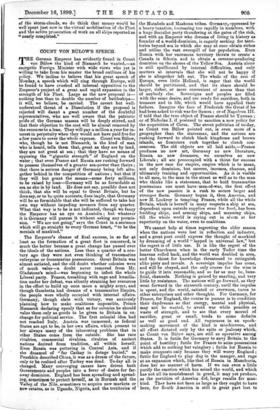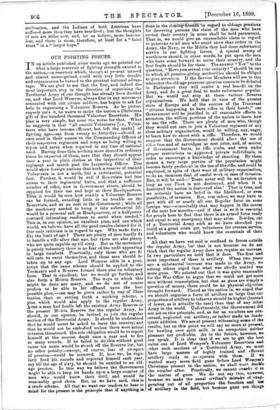COUNT VON BULOW'S SPEECH. T HE German Emperor has evidently found
in Count von Billow the kind of Bismarck he wanted,—an energetic Foreign Minister with wide views who yet is willing to take from his master the broad outlines of his policy. We incline to believe that his great speech of Monday, a speech which will ring through Europe, will be found to have crushed all internal opposition to the Emperor's project of a great and rapid expansion in the strength of his Fleet. Large as the new proposal is— nothing less than to double the number of battleships— it will, we believe, be carried. The covert but well- understood threat of a Dissolution if the proposal is rejected will daunt a gnat number of the doubtful representatives, who are well aware that the patriotic pride of the German masses will be deeply stirred, and that their objection to the cost will be almost removed by the recourse to a loan. They will pay a million a year for in- terest in perpetuity when they would not have paid five for a few years to cover the whole expense. Count von Billow, who, though he is not Bismarck, is the kind of man who is heard, tells them that, great as they are by land, they are not great at sea ; that they have no means of opposing the " gigantic strength" of England on the water ; that even France and Russia are rushing forward to possess themselves of a greater sea-power than theirs ; that there is serious danger of Germany being left alto- gether behind in the competition of nations ; but that if they will but grant the means—some forty millions, to be raised by loan—Germany will be as formidable at sea as sheds by land. He does not say, possibly does not think, that she will be equal to Great Britain, but he does say, or to be quite accurate, does imply, that Germany will be so formidable that she will be suffered to take her own way without impeding menaces from any quarter. What that way is to be is not indicated, though we fancy the Emperor has an eye on Anatolia ; but whatever it is Germany will pursue it without asking any permis- sion. " We are not going," says the Count in a sentence which will go straight to every German heart, " to be the menials of mankind."
The Emperor's chance of final success, in so far at least as the formation of a great fleet is concerned, is much the better because a great change has passed over the ideals of the nations. Less than a quarter of a cen- tury ago they were not even thinking of transmarine enterprise or transmarine possessions. Great Britain was almost satiated, and the old doubt whether colonies were of much value—a doubt never removed from Mr. Gladstone's mind—was beginning to infect the whole Liberal party. France, trembling with rage and humilia- tion under her defeat, was silently straining her resources in the effort to build up once more a mighty army, and though Gambetta had dreams of a transmarine Empire, the people were wholly occupied with internal affairs. Germany, though elate with victory, was anxiously planning how to make coalitions impossible, Prince Bismarck declaring openly that as for colonies he should value them only as goods to be given to Britain in ex- change for political service. The first colonial idea had not reached Italy. Austria was immersed, as federal States are apt to be, in her own affairs, which present to her always many of the interesting problems that in other States come from the outside. She has race rivalries, commercial rivalries, rivalries of ancient nations derived from tradition, all within herself. Even Russia was pottering in Central Asia, and if she dreamed of " far Cathay in dotage buried," as Poushkin described China, it was as a dream of the future, only to-be realised after Turkey was dead. To-day all is changed. Many converging causes have driven both Governments and peoples into a fever of desire for far- away dominion. England has been spreading and spread- ing, sometimes to protect herself, as in Burmah and the Valley. of the Nile, sometimes to acquire new markets or new estates, as in Uganda, Nigeria, and the territories of the Matabele and Mashona tribes. Germany, oppressed by a heavy taxation, increasing too rapidly in numbers, with a huge Socialist party thundering at the gates of the rich, and with an Emperor who dreams of living in history as founder of a world-dominion, is eagerly seeking for terri- tories beyond sea in which she may at once obtain riches and utilise the vast overspill of her population. Evpn Russia with her enormous territory thirsts to create a Canada in Siberia and to obtain a revenue-producing dominion on the shores of the Yellow Sea. Austria alone is still spellbound by internal difficulties, and only mutters at intervals that she will not be happy if she is altogether left out. The whole of the rest of Europe, even little Holland, is eager that the world should be partitioned, and that its share should be larger, richer, or more convenient of access than that of anybody else. Sovereigns and peoples are filled with the same desire, and are ready for sacrifices, both in treasure and in life, which would have appalled their fathers. Imagine the face of Frederick the Great if he bad been asked to risk war for Samoa ; or of Napoleon III. if told that the true object of France should be Yunnan ; or of Nicholas I. if pestered to sanction a new policy for the acquisition of Corea. The street politician of to-day, as Count von Billow pointed out, is even more of a geographer than the statesman, and the nations are rushing forward to clutch black kingdoms and brown islands, as financiers rush together to clutch con- cessions. The old objects are all laid aside,—France produces no new art, Germany no new literature, Russia no new dreamers, we ourselves no new Liberals ; all are preoccupied with a thirst for success in the new race for empire, empire which is to mean, not only dominion, but careers, incomes, chances, and ultimately training and opportunities. As it is visible to all men, to the man in the street as well as to the man who thinks like a statesman, that to hold transmarine possessions one must have men-of-war, the first effect of the new passion is a rush to secure larger and stronger fleets. Germany began it, then America, and now M. Lockroy is tempting France, while all the while Britain, which is herself in many respects a ship at sea, dependent upon outside supplies even for food, has been building ships, and arming ships, and manning ships, till the whole world is crying out in sham at her superiority on the water, even to coalitions.
We cannot help at times regretting the older season when the nations were lost in reflection and industry, and a great poet could express the thought of mankind by dreaming of a world " lapped in universal law," but the regret is of little use. It is like the regret of the better Churchmen when in the early Tudor time the heavens rolled back, and the world was doubled in area, and the thirst for knowledge threatened to extinguish alike piety and morals. A sovereign impulse has come, and will be obeyed, and the only course for the wise is to guide it into reasonable, and so far as may be, bene- ficial, channels. Nothing is gained by snarling, and very little by resistance. The nations will go forward, as they went forward in the sixteenth century, until the impulse is spent, and the world, satiated or overworn, turns to other enterprises and other thoughts. For Germany, for France, for England, the course to pursue is to condition their daydreams so that energy, mental and physical, may not be wasted, to avoid war while possible as waste of strength, and to see that every morsel of sacrifice, great or small, tends to some definite as well as good end. All vagueness in an epoch- making movement of the kind is mischievous, and all effort dictated only by the spite or jealousy which, as Count von Billow says, are still so operative among States. It is futile for Germany to envy Britain. to the point of hostility ; futile for France to seize possessions which add to nothing but vainglory ; futile for Russia to make conquests only because they will worry England ; futile for England to play dog in the manger, and rage at an expansion which, like that of Russia in Manchuria, does her no manner of harm. If we can even a little purify the emotion which has seized the world, and which has not all its nourishment in greed, it may yet produce, as the partition of America did, large results for man- kind. They have not been as large as they ought to have been, for South America is still in great part lost to
civilisation, and the Indians of both Americas have suffered more than they have benefited ; but the thoughts of men are wider now, and, let us believe, more benevo- lent, and there is room, therefore, at least for a " faint trust" in a " larger hope."











































 Previous page
Previous page